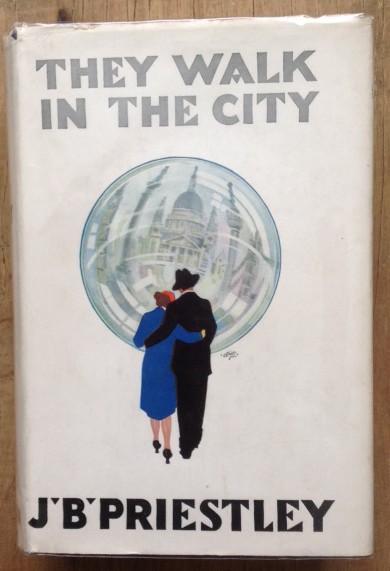Inspiring Older Readers
 posted on 17 Jul 2018
posted on 17 Jul 2018
They Walk In The City by J.B. Priestley
I think it’s fair to say that Priestley isn’t so much a ‘novelist’ as a storyteller. And like so many top rate weavers of tales he can take quite meagre resources and spin a web of detail that ends up feeling and looking much more substantial than it actually is. His 500 page blockbuster, They Walk In the City, which was first published in 1936, is a perfect example of his art and as I sit here writing this review I’m struck by just how gossamer-thin the plot of the book is around which such a bulk of detail has been grafted.
Appropriately enough, the book is dedicated to H.G. Wells and it’s impossible not to have Priestley’s mentor in your mind when you’re reading it – there is something essentially Edwardian in the style and content despite the rude intrusion of very much more contemporary problems like the rise of Fascism.
The plot revolves around the pretty and sweetly naïve, Rose Salter and her rather sullen and frustrated boyfriend, Edward Fielding. Both of them live in a small town, Haliford, in the West Riding of Yorkshire and both of them separately harbour a desire to get away – a shared feeling that there must be more to life than what they have.
The paths of Rose and Edward seem to take an unconscionable amount of time to cross and they are, it transpires, doomed to pass as ships in the night for most of the book – every time they seem to have hooked up, fate steps in and they are parted.
When Rose eventually takes the plunge and heads for London with a friend, dopy Edward can do nothing but follow. Finding Rose, however, turns out to be more of a problem even than getting a worthwhile job. Every time he thinks he has tracked her down he discovers Rose has moved on to something else and he’s left to start looking again.
Rose is essentially a victim waiting to be preyed on and, in London, there are plenty of people who will take without giving and prepared to pose as her friend in order to make use of her. Her desire to be liked and her willingness to be easily flattered leads her, as you might guess, into all sorts of scrapes including one which forces her to change her name in order to avoid the police.
When the two young lovers seem to have finally found each other again, Rose stumbles into a much more dangerous situation involving prostitution and murder. This part of the story occupies the last third of the book and really picks up the pace, becoming the most racy, intriguing and engaging episodes in the story of Rose and Edward – if all the rest of the novel is leading up to this dramatic denouement then it has to be said that it took way too long to get there.
At the end of the book they are resolved, once they have helped the police with the murder investigation, to return to Haliford because that’s where they belong – the evils of the big city are not for the likes of them.
In many ways this feels a book in which the messages are as conflicted as the time in which it was written. At one level it’s a rather conservative morality tale about simple Northerners and the perils and the dangers they face in wicked, sophisticated London. But at another level it’s also about the stifling dead hand of what might be called traditional Northern values that threaten to smother the hopes and dreams of young people.
To be honest, both Rose and Edward are humungous drips – she wouldn’t be out of place as one of Hardy’s irritatingly passive female victims and he is a sulky socially retarded boy who you frequently want to shake.
The biggest problem I’ve got, however, is with the unlikely trail of misadventures and mishaps that Priestley has to create to make the threadbare plot work at all. I didn’t like the characters enough to go along with his stretching of coincidence to virtual breaking point and some of Rose’s decisions – or lack of them – were really beyond the suspension of disbelief.
If there is a saving grace to this novel it’s Priestley’s capacity for good, readable, homespun prose that is deceptively easy to read. I’m not being snobby or patronising when I say that this felt like the perfect story for serialisation in a weekly magazine – or maybe perfect stuff for a Radio 4 dramatization in their afternoon theatre slot.
I’m pretty sure the book is out of print at the moment but you can find copies listed online for not very much. Buy it if you love a yarn well told with plenty of period detail and just a hint of nostalgia.
Terry Potter
July 2018